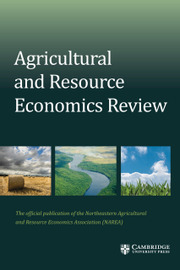Article contents
The Performance of Compliance Measures and Instruments for Nitrate Nonpoint Pollution Control Under Uncertainty and Alternative Agricultural Commodity Policy Regimes
Published online by Cambridge University Press: 15 September 2016
Abstract
Following Weitzman (1974), there is ample theoretical literature indicating that choice of pollution control instruments under conditions of uncertainty will affect the expected net benefits that can be realized from environmental protection. However, there is little empirical research on the ex ante efficiency of alternative instruments for controlling water, or other types of pollution, under uncertainty about costs and benefits. Using a simulation model that incorporates various sources of uncertainty, the ex ante efficiency of price and quantity controls applied to two alternative policy targets, fertilizer application rates and estimated excess nitrogen applications, are examined under varying assumptions about agricultural income support policies. Results indicate price instruments outperform quantity instruments. A tax on excess nitrogen substantially outperforms a fertilizer tax in the scenario with support programs, while the ranking is reversed in the scenario without support programs.
- Type
- Contributed Papers
- Information
- Copyright
- Copyright © 2004 Northeastern Agricultural and Resource Economics Association
References
- 1
- Cited by


